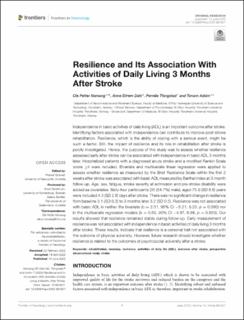| dc.description.abstract | Independence in basic activities of daily living (ADL) is an important outcome after stroke. Identifying factors associated with independence can contribute to improve post-stroke rehabilitation. Resilience, which is the ability of coping with a serious event, might be such a factor. Still, the impact of resilience and its role in rehabilitation after stroke is poorly investigated. Hence, the purpose of this study was to assess whether resilience assessed early after stroke can be associated with independence in basic ADL 3 months later. Hospitalized patients with a diagnosed acute stroke and a modified Rankin Scale score ≤ 4 were included. Bivariate and multivariate linear regression were applied to assess whether resilience as measured by the Brief Resilience Scale within the first 2 weeks after stroke was associated with basic ADL measured by Barthel Index at 3-month follow-up. Age, sex, fatigue, stroke severity at admission and pre-stroke disability were added as covariates. Sixty-four participants (35 (54.7%) male), aged 75.9 (SD 8.6) years were included 4.3 (SD 2.8) days after stroke. There was no significant change in resilience from baseline 3.1 (SD 0.3) to 3 months later 3.2 (SD 0.5). Resilience was not associated with basic ADL in neither the bivariate (b = 2.01, 95% CI −5.21, 9.23, p = 0.580) nor in the multivariate regression models (b = 0.50, 95% CI −4.87, 6.88, p = 0.853). Our results showed that resilience remained stable during follow-up. Early measurement of resilience was not associated with independence in basic activities of daily living 3 months after stroke. These results, indicate that resilience is a personal trait not associated with the outcome of physical adversity. However, future research should investigate whether resilience is related to the outcomes of psychosocial adversity after a stroke. | en_US |

